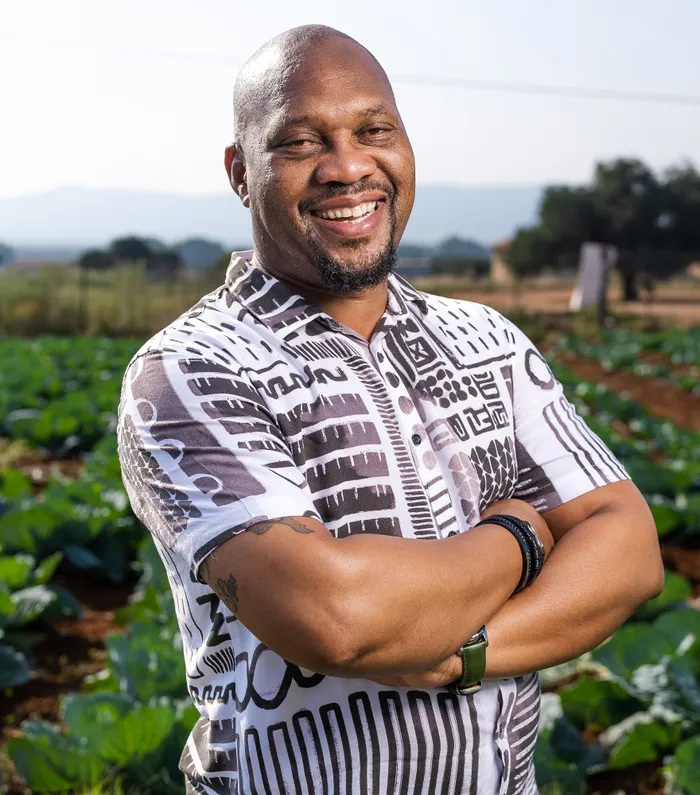Sniff, swirl, sip into the history books

Man in grey and white shirt stands outdoors in a field. Sommelier Moses Magwaza will today pair wine with indigenous food cooked by 10 chefs at the Harvesting Heritage Culinary Competition in Pretoria. Picture: Supplied.
Durban - Sniff, swirl, sip.
Easy to do if you love your wine, but not if you are in the unique position of renowned sommelier Moses Magwaza.
Today the award-winning wine practitioner from Hammarsdale, near Durban, will be the first person to professionally pair wine with indigenous African foods at the Harvesting Heritage Culinary Competition in Pretoria.
“It’s ingredients that bring out childhood memories, especially as a black child,” said Magwaza, winner of the 2018 Eat Out Wine Service Award and the 2020 Best Wine Service, Luxe Restaurant Awards.
Ten chiefs have been given the challenge to cook up a storm with indigenous ingredients, while they’ll also be given a surprise cut of meat and offal and will have to think on their feet to make it sizzle.
“I have been in the industry for 18 years, and I don’t remember any chefs preparing indigenous foods; they only talk about potjiekos,” said Magwaza.
From mopane hummus to fried locusts, Magwaza’s tongue will be tingling throughout the day as the chefs put their spin on herbs, fruits and pulses, all traditionally African and many no longer widely known or used.
“I’m used to the Greek hummus, I have no idea what mopane hummus will taste like, so it’s a challenge but an exciting challenge,” he said. Magwaza hasn’t tasted the dishes ahead of the event, but based on the recipes the chefs submitted, he has an idea what wine will complement the spices used.
“The flavour profile of the main ingredient will be there. It doesn’t serve the purpose if you over-spice or change the flavour, you still have to taste the ingredient,” said Magwaza.
It’s a huge moment for the indigenous ingredients that range from varieties of morogo like monawa and lerotho, bambara beans (a substitute for chickpeas) and okra, to nuts from the pips of marula fruit, marula jelly, lerotsi (melon), xigugu, zebra beans, African cucumber, and goat meat (chevon).
Magwaza said some of the ingredients he had completely forgotten about and fortunately he and the chefs visited the farmers to learn about their crops and get a taste of them.
That, he says, helped him to get an idea of what today’s dishes could taste like because “you always need to have a test drive in your head”.
He’ll be pairing the dishes with wines from Nederburg’s exclusive Heritage Heroes range, crafted by some of its first winemakers and still in production today. “It actually goes well with the purpose of the event,” he said.
The cook-off is part of the Harvesting Heritage initiative which aims to protect heritage crops and preserve indigenous knowledge. The organisation has paired up with SocioTech and Nederburg and collaborates with chefs, traditional councils and municipalities to revive traditional tastes and cuisines and create a market for the crops.
Magwaza said the last time he ate locusts was as a 10-year-old running around with his cousins in Hammarsdale, where he grew up.
That’s where he harboured ambitions to become a fireman, but attempts to eke out a living saw him move to Gauteng and take on a job as gardener and handyman at Restaurant Mosaic at The Orient Hotel in the Francolin Conservancy, near Pretoria.
One day he and restaurant owner Cobus du Plessis were cleaning the cellar which contained 75 000 bottles of wine under 500 different labels from across the world. When Du Plessis discovered that Magwaza had never tasted wine, he went upstairs and returned with a glass of rosé which Magwaza said literally changed his life. From that day he harvested every bit of information he could about the industry and was taken under the wing of Restaurant Mosaic’s French sommelier, Germain Lehodey, and Cape Wine Master Junel van der Merwe.
Then followed certifications from the Cape Wine Academy and the Wine and Spirit Education Trust (WSET), UK. Now he is the sommelier and restaurant manager at Prosopa, Pretoria.
Despite his accolades, it took his mom, a devout Christian who hates wine, a long time to accept his job. “She said, are you drinking for a living? Is this real work or is this just an excuse to drink?”
Then Magwaza’s son was left confused when he heard people call his dad a sommelier. “He said, dad are we Somalian… I had to sit him down and say, son, you are a Zulu and this is a job.”
Magwaza said being a sommelier had exposed him to many experiences and opened many doors for him, including travelling to places around the world like Champagne.
He encouraged young people to cast aside the negative connotations they have of working in the restaurant industry and take the chance to learn while they earn and enter fields that once seemed out of reach.
The Independent on Saturday
Related Topics: